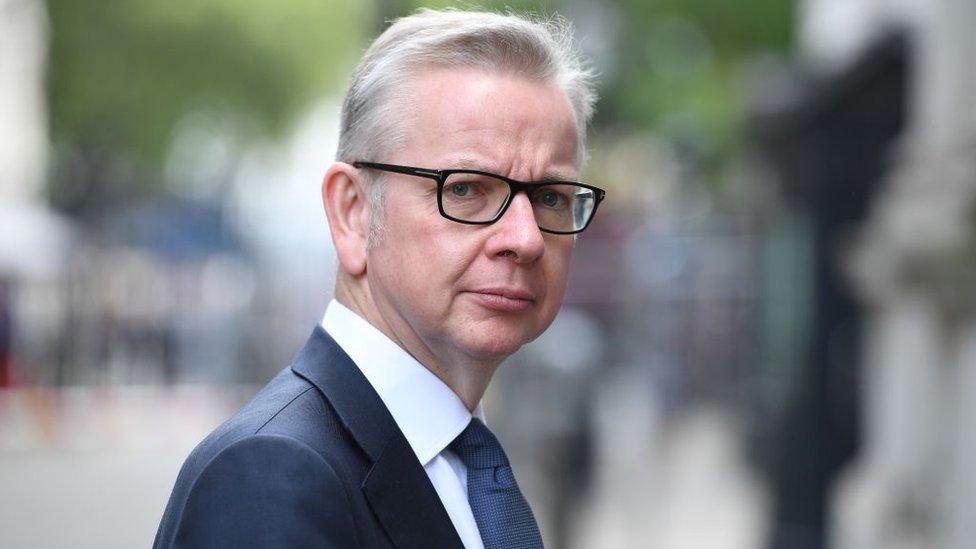Levelling up to cost billions more than government thinks, says think tank
- Published
- comments

Michael Gove is the cabinet's Levelling Up Secretary
Government plans to "level up" cities around the UK will cost billions more than thought, a think tank has said.
Research by the Resolution Foundation found differences in income across the UK were "significant" and "persistent".
The government's levelling up agenda is designed to close economic gaps between different parts of the UK.
But only traditionally poorer areas of London such as Hackney and Newham have seen significant improvement over the last 25 years, the new report found.
The think tank said levelling up will require investment that goes "far beyond anything currently being contemplated" by the government.
The government welcomed the report which it said showed the vital importance and urgency of "levelling up all parts of the UK".
Lindsay Judge, research director at the Resolution Foundation, said progress had been made in reducing employment gaps between cities but this had been "offset by a surge in investment income among better-off families in London and the South East".
Ms Judge said: "The key to closing these gaps is to boost the productivity of our major cities outside London, which will also lead to stronger growth overall."
The richest part of the country, Kensington and Chelsea, is in the capital and its residents earn, on average, 350% more than those in Nottingham, which is the poorest.
The report also found that the average annual income in Oxford, which is in the top 25% of local authority areas, is a fifth higher than in Torbay, in Devon, which is in the bottom 25% of areas.
Researchers found these gaps have been reinforced by how much income people in different parts of the country have made from investments.
In 2019, people living in the London borough of Camden made an average of £9,135 from investments, compared with just £806 in Knowsley, Merseyside, which is one of the most deprived boroughs in the country.
'Poor record on investment'
In a second report to be published on Thursday, the Resolution Foundation will argue that current government policies fall short.
The think tank said that closing the gap between London and Manchester, where productivity is 30% lower than in the capital, will require tens of billions of pounds of investment, an extra 300,000 workers moving to Greater Manchester and more university graduates working in the city.
Henry Overman, professor of economic geography at the London School of Economics, said addressing disparities in productivity "will require Britain to completely turn around its poor record on investment".
In February, the government it set out its White Paper for levelling up - an official document outlining its strategy.
At the time, Levelling Up Secretary Mr Gove said "while talent is spread equally across the United Kingdom, opportunity is not".
The White Paper included £100m of new investment for innovation centres to boost research and development in Greater Manchester, the West Midlands and Glasgow, as well as a £1.5bn fund to give loans to small and medium-sized house builders for new homes mostly outside London and the South-East.
Mr Gove also outlined other funding pledges, including:
£5bn in bus services and active travel
£1.8bn invested in new housing infrastructure, turning brownfield land into projects across the country
£230m extra in grassroots football
£30m allocated to improving parks and urban green spaces
An extra £560m in activities for young people
An additional £150m in a safer streets fund
Mr Gove previously told the BBC the strategy was not aimed at providing new funding but ensuring money was spent effectively on local priorities.
Responding to the Resolution Foundation report the Department for Levelling Up, Housing and Communities said that while the cost-of-living crisis would make levelling up more challenging it also made it more urgent and necessary.
A spokeswoman said: "We welcome this report and its findings, which highlight the vital importance and urgency of levelling up all parts of the UK.
"Our Levelling Up and Regeneration Bill will enshrine in law our commitment to closing the gap in pay and productivity across regions.
"By investing in the areas that need it most, improving schools, supporting regeneration and generating higher paid jobs we will improve the lives of the poorest in areas across the UK."
Related topics
- Published2 February 2022

- Published2 February 2022
